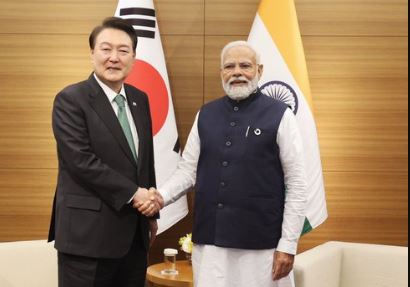Hiroshima: Prime Minister Narendra Modi and South Korean President Yoon Suk Yeol Saturday reviewed the progress in the bilateral strategic partnership and agreed to deepen cooperation in areas like trade and investment, defence, semiconductors and cutting-edge technologies.
The two leaders held productive bilateral talks on the sidelines of the summit of the Group of Seven (G7) advanced economies in Hiroshima. They also discussed India’s G20 presidency and South Korea’s Indo-Pacific strategy.
During the talks, they reviewed the progress of the India–Republic of Korea Special Strategic Partnership and discussed ways to strengthen bilateral cooperation, particularly in areas of trade & investment, high technology, IT hardware manufacturing, defence, semiconductors and culture, the Ministry of External Affairs (MEA) said in a statement.
The leaders noted that both countries are celebrating the 50th anniversary of the establishment of diplomatic relations this year, and agreed to enhance their cooperation further, it said.
President Yoon Suk Yeol appreciated Prime Minister Modi’s leadership of the G-20 and conveyed his support. Prime Minister looked forward to President Yoon’s visit to India for the G20 Leaders’ Summit in September this year.
India is presently holding the presidency of the G20 grouping.
Prime Minister Modi welcomed the Republic of Korea’s Indo-Pacific strategy and the importance attached to India in it.
South Korea launched its first comprehensive regional strategy, the Indo-Pacific Strategy in December 2022.
The US, India and several other world powers have been talking about the need to ensure a free, open and thriving Indo-Pacific in the backdrop of China’s rising military manoeuvring in the resource-rich region.
China claims nearly all of the disputed South China Sea, though Taiwan, the Philippines, Brunei, Malaysia and Vietnam all claim parts of it. Beijing has built artificial islands and military installations in the South China Sea. China also has territorial disputes with Japan in the East China Sea.
The leaders also had a positive exchange of views on regional developments.
“PM @narendramodi had a productive meeting with @President_KR Yoon Suk Yeol. India and the Republic of Korea share a warm friendship and deep-rooted cultural linkages. Today’s talks focused on ways to further cement this friendship in key developmental sectors,” the MEA tweeted.
“Advancing – Special Strategic Partnership. PM @narendramodi met @President_KR Yoon Suk Yeol of the Republic of Korea,” it said.
“The president said South Korea and India should jointly respond to regional and global issues in solidarity as countries that share democratic values,” South Korea’s presidential spokesperson Lee Do-woon said in a statement.
Yoon thanked Modi for taking part in the Summit for Democracy co-hosted by South Korea and the United States in March.
“Prime Minister Modi expressed his agreement, saying the two countries should strengthen strategic communication and cooperation,” he was quoted as saying by South Korea’s Yonhap news agency.
Yoon and Modi held in-person talks for the first time, agreeing to develop a special strategic partnership between the two countries in a substantive manner, according to Lee.
“The two leaders agreed to advance cooperation not only in arms, which include K-9 self-propelled howitzers but also in cutting-edge technologies, such as digital, bio-health and space,” the spokesperson said.
“In particular, they agreed to upgrade the Comprehensive Economic Partnership Agreement that went into effect between South Korea and India in 2010 and to further expand bilateral trade and find new areas of cooperation to prepare for the next 50 years,” he said.
The two leaders also discussed issues related to the Korean Peninsula, the Indo-Pacific and beyond, sharing the view that the two like-minded nations are building a firm framework for cooperation on the basis of democratic solidarity.
They agreed to jointly contribute to regional peace and stability by harmonising South Korea’s Indo-Pacific Strategy and India’s Act East Policy.
They also agreed to jointly support efforts to fight climate change and help develop emerging and developing nations in the so-called Global South. Yoon and Modi agreed to meet again and continue discussions on the occasion of the G-20 summit to be held in India in September while activating high-level channels between the two countries, Lee said.
Modi arrived in Hiroshima Friday to attend three sessions at the G7 summit following an invitation by Japanese counterpart Fumio Kishida.
PTI
